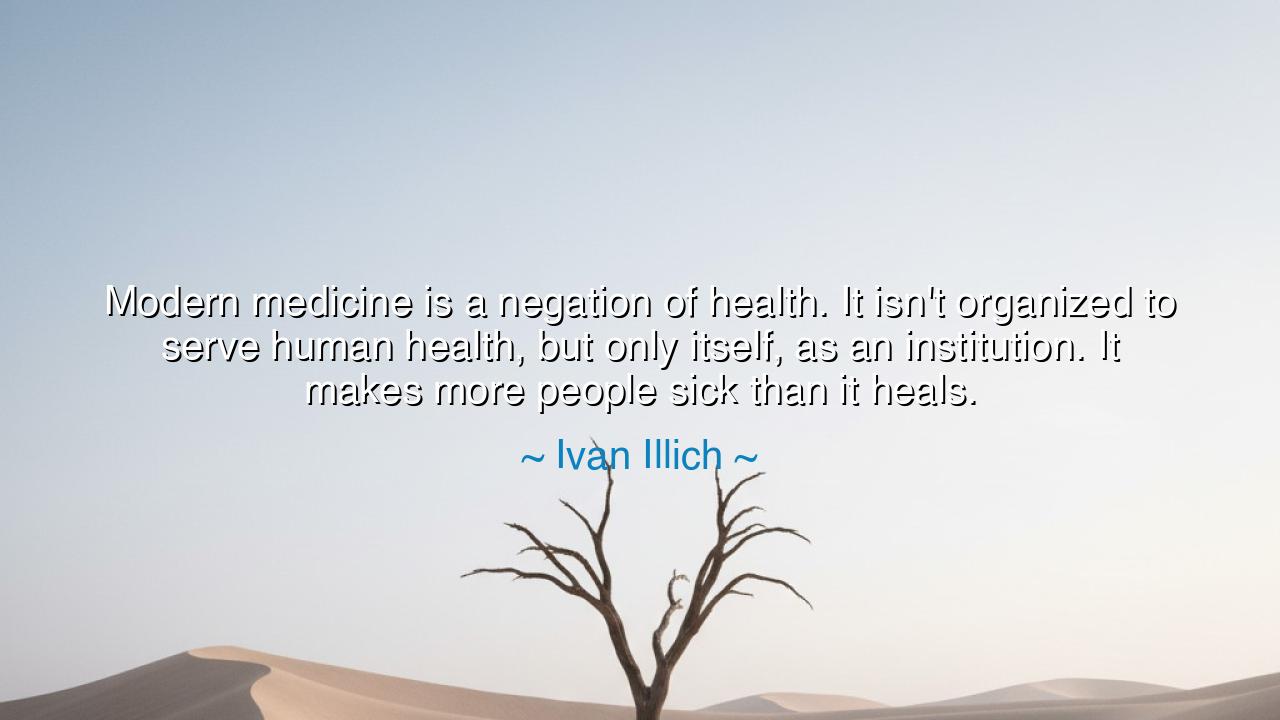
Modern medicine is a negation of health. It isn't organized to
Modern medicine is a negation of health. It isn't organized to serve human health, but only itself, as an institution. It makes more people sick than it heals.






In an age when hospitals rise like temples and the white coat is seen as the robe of salvation, the philosopher and social critic Ivan Illich spoke words that thundered through the complacency of modernity: “Modern medicine is a negation of health. It isn’t organized to serve human health, but only itself, as an institution. It makes more people sick than it heals.” His words are not born of cynicism, but of profound sorrow and moral courage. They are the lament of a man who looked upon the towering edifice of medical progress and saw, beneath its gleaming surface, the shadow of dependence and dehumanization. Illich’s message is both ancient and eternal: that when the healer forgets the human, healing itself becomes an illusion.
The origin of these words lies in Illich’s 1975 book Medical Nemesis: The Expropriation of Health, a work that dared to question the sacred authority of modern medicine. He lived in a century intoxicated by technological miracles — antibiotics, surgeries, vaccines — yet haunted by the paradox that the more medicine advanced, the more humanity seemed to lose control over its own well-being. Illich, a scholar-priest turned rebel thinker, saw that the medical system had grown into a vast institution, serving its own perpetuation rather than the people it claimed to heal. In his eyes, medicine had become an empire of dependency — teaching men and women to fear their own bodies, to surrender their instincts, to believe that health was something to be administered rather than lived.
When Illich calls modern medicine a “negation of health,” he does not deny the power of science to cure disease. Rather, he warns that health has come to mean the absence of illness, rather than the presence of vitality. The body, once a wise and self-regulating organism, is now treated as a malfunctioning machine, to be managed by experts and technologies. Thus, people are no longer seen as beings with natural rhythms, resilience, and balance, but as patients — passive, helpless, waiting for permission to be whole. Illich’s anger was not directed against the doctor’s compassion, but against the system that turned compassion into control. For in chasing perfect health through endless intervention, modern medicine, he said, had become the very thing it once sought to destroy: a source of suffering itself.
History offers countless reflections of Illich’s insight. Consider the tale of Ignaz Semmelweis, a Hungarian physician of the nineteenth century, who discovered that simple handwashing could prevent the deaths of countless mothers in childbirth. His revelation should have transformed medicine. Instead, the institution — bound by pride and hierarchy — rejected him. Doctors mocked him, clung to their authority, and condemned thousands more women to needless death. Semmelweis, broken and scorned, died in an asylum. His tragedy, like Illich’s warning, reminds us that institutions often love their rituals more than their truth. What Illich saw in his own time was the same pattern magnified: the system of medicine, driven by profit, prestige, and power, serving itself while the sick remain unseen beneath its weight.
Yet Illich’s critique is not despairing. His vision is one of reclamation — of returning health to the hands of the people. He reminds us that true health cannot be prescribed; it must be cultivated. It lies not in the pill or the procedure, but in harmony — harmony between body and spirit, between man and nature, between self and society. Health, in Illich’s ancient understanding, is not perfection but balance, not immunity from pain but peace within it. When he says medicine “makes more people sick than it heals,” he speaks also of the sickness of dependency — of the fear that we cannot live without constant intervention. To be healed, Illich teaches, is first to recover one’s confidence in life itself.
He was not alone in his cry. The ancient physicians of Greece, followers of Hippocrates, also knew that medicine should be the servant of nature, not its master. They taught that the role of the healer is to support the body’s natural power to mend itself — to do no harm, to respect the rhythms of life. In this way, Illich’s critique is less an attack on science than a reminder of its forgotten soul. When medicine ceases to see the human person — when it treats disease but ignores despair, repairs the body but neglects the spirit — it ceases to be medicine at all.
So, O seeker of wisdom, take this teaching not as rebellion, but as remembrance. Use the gifts of modern medicine wisely, but never worship them blindly. Listen to your body as you would listen to an elder — with patience, humility, and trust. Let the physician’s skill serve your strength, not replace it. Seek balance before remedy, and harmony before cure. And above all, remember that health is not given by institutions, but nurtured by living — by eating with gratitude, moving with purpose, resting with peace, and loving without fear.
The lesson of Ivan Illich’s words endures as a flame in an age of cold machinery: that to be truly well is not merely to be free of disease, but to be fully alive. Medicine may mend the wound, but only wisdom can heal the soul. Therefore, guard your health not as a possession, but as a way of being — a sacred art of balance between nature, knowledge, and the human heart. For when medicine serves life rather than its own authority, it will once more become what it was always meant to be: the hand of compassion, not the shadow of control.






AAdministratorAdministrator
Welcome, honored guests. Please leave a comment, we will respond soon